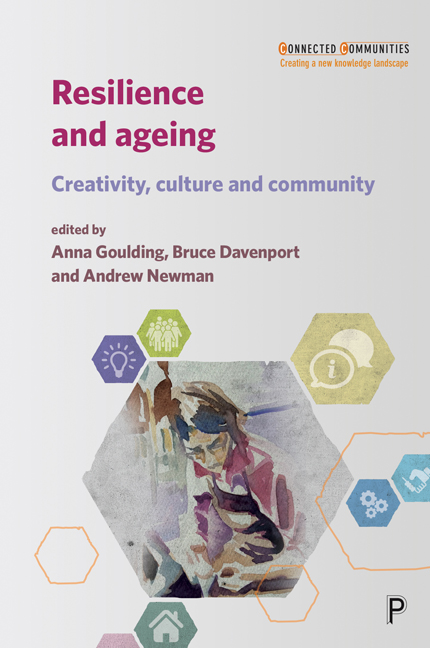Book contents
- Frontmatter
- Contents
- List of figures, tables and boxes
- Notes on contributors
- Series editors’ foreword
- Introduction
- one Setting the field: older people’s conceptualisation of resilience and its relationship to cultural engagement
- two Ages and Stages: creative participatory research with older people
- three Social connectivity and creative approaches to dementia care: the case of a poetry intervention
- four Narrative identity and resilience for people in later life with dementia living in care homes: the role of visual arts enrichment activities
- five After the earthquake: narratives of resilience, re-signification of fear and revitalisation of local identities in rural communities of Paredones, Chile
- six Integrating sense of place within new housing developments: a community-based participatory research approach
- seven Ageing in place: creativity and resilience in neighbourhoods
- eight Crafting resilience for later life
- nine Oral histories and lacemaking as strategies for resilience in women’s craft groups
- ten Objects of loss: resilience, continuity and learning in material culture relationships
- eleven Later-life gardening in a retirement community: sites of identity, resilience and creativity
- Index
eleven - Later-life gardening in a retirement community: sites of identity, resilience and creativity
Published online by Cambridge University Press: 19 April 2022
- Frontmatter
- Contents
- List of figures, tables and boxes
- Notes on contributors
- Series editors’ foreword
- Introduction
- one Setting the field: older people’s conceptualisation of resilience and its relationship to cultural engagement
- two Ages and Stages: creative participatory research with older people
- three Social connectivity and creative approaches to dementia care: the case of a poetry intervention
- four Narrative identity and resilience for people in later life with dementia living in care homes: the role of visual arts enrichment activities
- five After the earthquake: narratives of resilience, re-signification of fear and revitalisation of local identities in rural communities of Paredones, Chile
- six Integrating sense of place within new housing developments: a community-based participatory research approach
- seven Ageing in place: creativity and resilience in neighbourhoods
- eight Crafting resilience for later life
- nine Oral histories and lacemaking as strategies for resilience in women’s craft groups
- ten Objects of loss: resilience, continuity and learning in material culture relationships
- eleven Later-life gardening in a retirement community: sites of identity, resilience and creativity
- Index
Summary
Editorial introduction
This chapter explores the experience of gardening in later life, focusing on how older people who move to a retirement community maintain or reinterpret their gardening identity. The authors discuss how gardening is a site of identity, creativity and resilience in ageing: a strategy for defining and maintaining ‘body, mind and spirit’ in their new home. Phenomenographic analysis (that is, analysis which explores the variation in people's experiences) revealed that residents experienced later-life gardening in five ways: the productive gardener; the creative gardener; the restricted gardener; the contemplative gardener; and the social gardener. This chapter highlights the significance of designing retirement communities that encourage engagement between residents and the creative leisure pursuit of gardening as a means of supporting individual happiness, pleasure and resilience.
Introduction
Throughout their lives, people often derive great pleasure from participating in creative activities. Whether participation is passive (for example, reading, attending theatre, listening to music) or more active (for example, photography, singing in a choir, creative writing, visual art, dancing, playing a musical instrument), a vast body of research literature confirms what we all intuitively know: engaging with creative activities has multiple psychological, emotional, psychological and physical health benefits, fostering overall life satisfaction and contributing to a higher quality of life, health and happiness as we age (Vaillant, 2002; Cohen et al, 2006; Dupuis and Alzheimer, 2008). Of course, creative activities need not only fit traditional notions of those arts-based examples provided above; rather, creativity can be accessed and practised through a myriad of everyday engagements. For Hallam and Ingold (2007), creativity is a state of being that is embedded in everyday living – a point poignantly made by McFadden and Basting, who argue that older people ‘display creativity when they bring something new that has value into the world … a poem written for a grandchild's birthday, a recipe modified to take advantage of garden vegetables, a song written in celebration of a friend's retirement, or a story told by a campfire’ (McFadden and Basting, 2010, p 151). Indeed, while seemingly insignificant, these lived moments of creativity offer rich psychosocial experiences that are meaningful throughout the lifecourse and often take on a special salience in later years (Bhatti et al, 2009).
- Type
- Chapter
- Information
- Resilience and AgeingCreativity, Culture and Community, pp. 249 - 266Publisher: Bristol University PressPrint publication year: 2018



